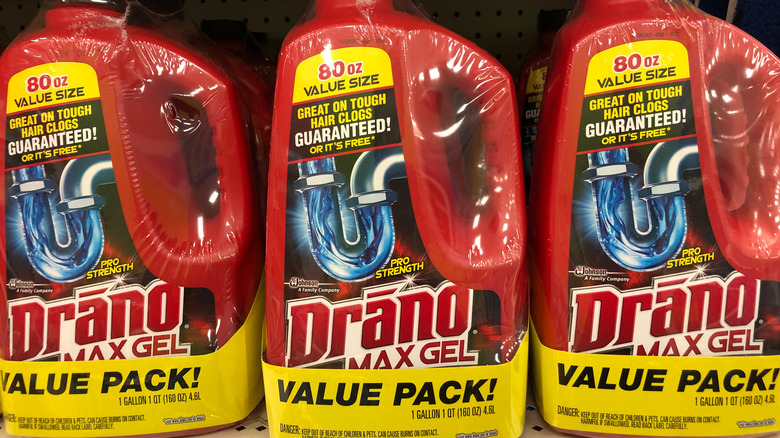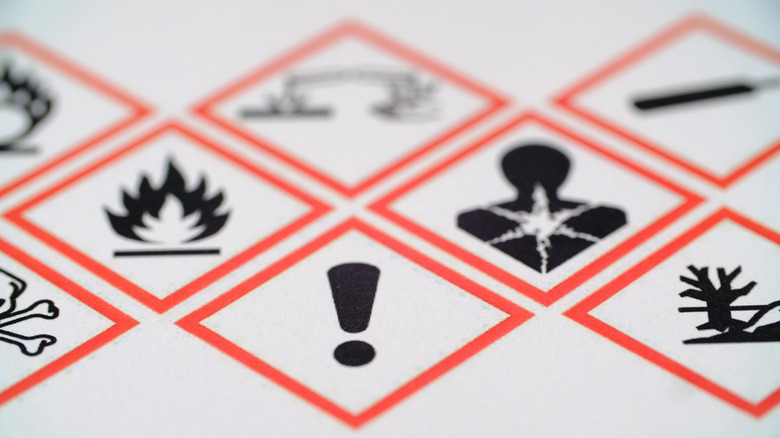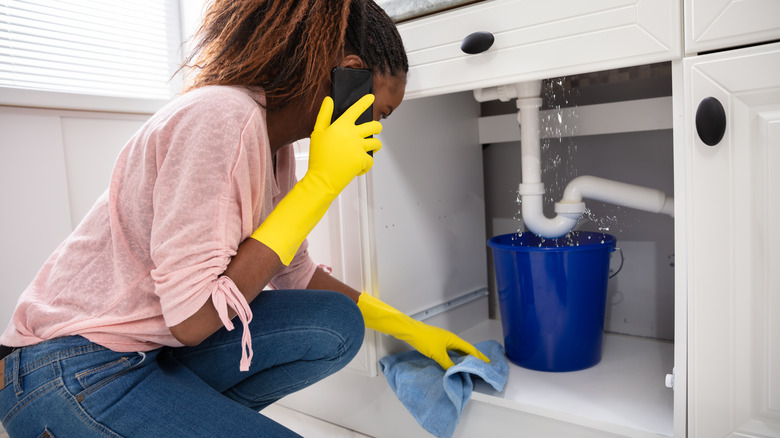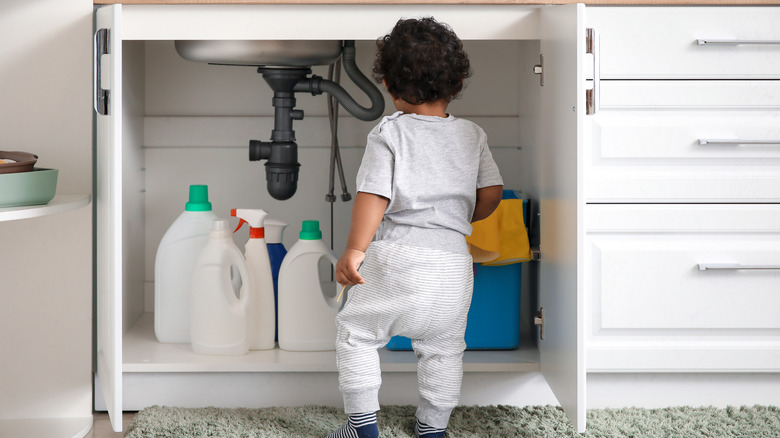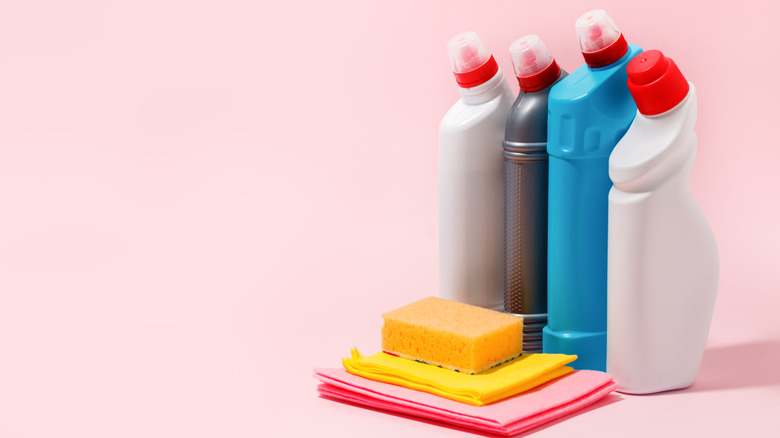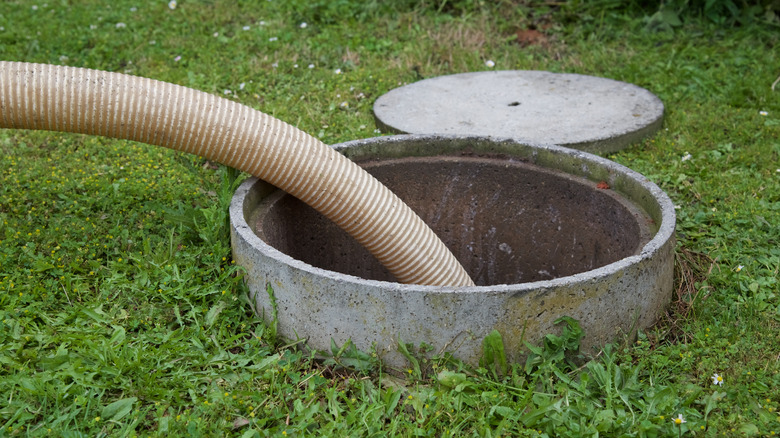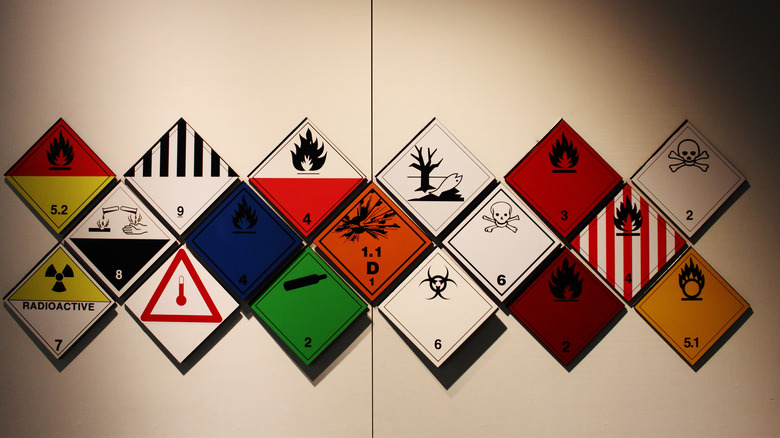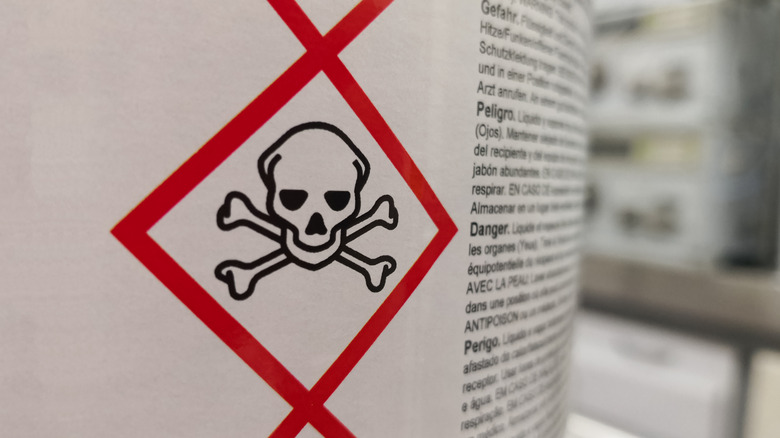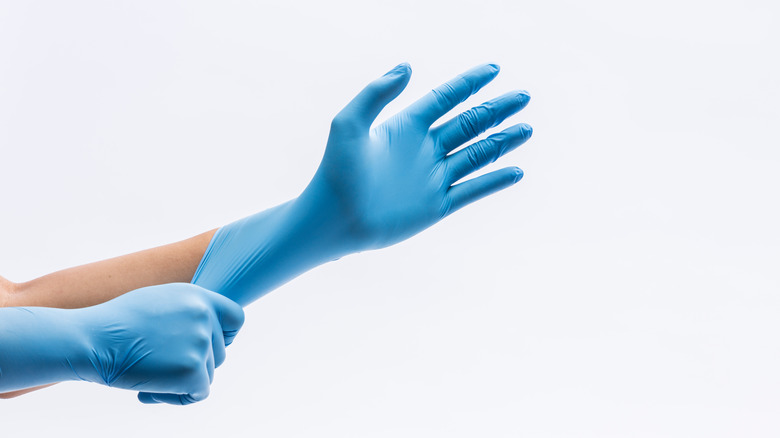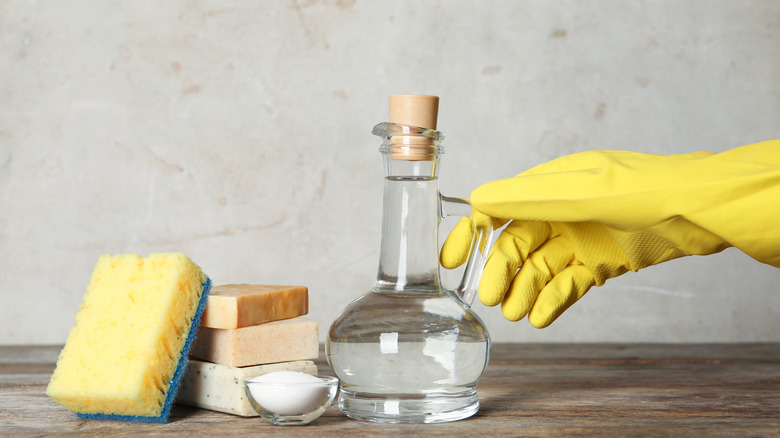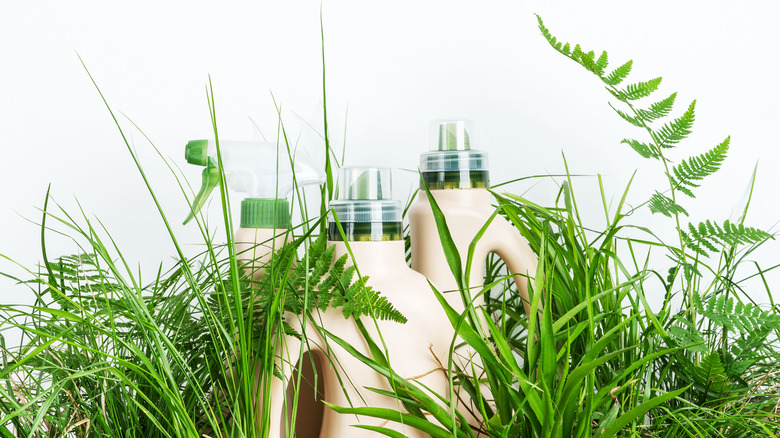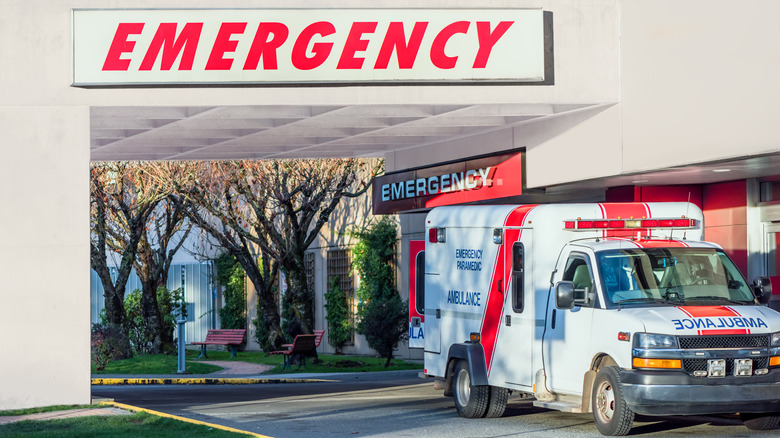The Dangerous Truth You Need To Know About Chemical Drain Cleaners
Nasty clogs in your drains can be a nightmare to sort out, and for many, the easiest solution is pouring bottled chemical drain cleaner straight down the sink. These powerful products can go to work fast on your drains due to a mix of potent, fast-acting chemicals that clear stubborn blockages quickly. And despite a recent shift towards greener cleaning solutions and do-it-yourself home formulas for getting things sparkling clean, the global drain cleaner market continues to boom, estimated to grow approximately 5.6% by 2026 to a total of over $2.5 billion, according to Research and Markets.
But there's a reason why these products are so effective: The chemicals that drain cleaners contain are incredibly powerful, and one false move with these products can mean serious damage to your pipes, the environment — or even yourself. Chemical drain cleaners can cause harm to some of the most vital parts of your body, and in the most extreme circumstances can even be fatal, states WebMD. In this article, we're going to pull off the lid on chemical drain cleaners and tell you the dangerous truth you need to know, as well as some top tips for safety — and show you why you might want to consider alternatives.
The ingredients in chemical drain cleaners can be harmful to human health
One look at the ingredients list of your average chemical drain cleaner, and you'll see that they're no joke. Chemical drain cleaners generally fall into three categories: acid drain cleaners, oxidizing drain cleaners, and caustic drain cleaners — and all of them contain high-intensity active ingredients, says Envirofluid. Some of the chemicals that are typically present include hydrochloric acid and sulphuric acid, both of which are highly corrosive and harmful to human health; bleach, which can produce toxic fumes and skin irritation; and lye (or sodium hydroxide), which is extremely caustic and can burn your skin, harm the inner membranes of the body, and cause hair loss, per the CDC.
A look at the pH level of most chemical drain cleaners should tell you everything you need to know about how powerful they are, and how harmful they can be. Caustic drain cleaners will generally have a pH level of 12 to 14, the highest end of the scale, whereas acid-based drain cleaners will have a pH of 0 to 1, at the other end, according to Xion Lab. Both of these levels indicate that these cleaners operate with the highest intensity possible, and if you have too much exposure to them, they can be seriously damaging.
Chemical drain cleaners can actually harm your pipes
For a product that generally clears out your pipes, you wouldn't expect that they do damage to them as well — but that's exactly what they can do. Chemical drain cleaners can degrade pipes, particularly old pipes, if used with enough frequency, according to Terry's Plumbing. This could be a particular problem for higher-strength acidic drain cleaners that contain sulfuric acid, a reactive substance that's well-known for being able to dissolve most metals, states Science Direct. Plastic pipes can also be damaged by chemical drain cleaners due to the creation of heat by the cleaner, which can lead to melting or warping of the pipe.
It's little wonder that these cleaners are so harmful to pipes; they can cut through much more than that. According to a study published in the Journal of Forensic Sciences, substances used in drain cleaners like sulfuric and hydrochloric acid were able to dissolve human tissue — including teeth, fingernails, and bone. Hydrochloric acid in particular was so effective that it dissolved these body parts in under 24 hours. Think about that next time you're glugging drain cleaner down your pipes!
Chemical drain cleaners can be a huge risk to children
Kids are curious little folks, and their small, prying hands can get into cupboards that they should really steer away from — and this can be hugely risky. Household cleaners, including chemical drain cleaners, are responsible for a large amount of unintentional poisoning or burn incidents among children per year; almost 2,000 emergency room visits were reported as a result of contact with household cleaners between 2018 and 2019, according to the Consumer Product Safety Commission. In 2017, incidents involving household cleaning products (including drain de-clogger) amounted to 11% of phone calls made to poison control centers for kids aged 6 and under, says Consumer Reports.
It's important to remember that your children can get into places you wouldn't think, and so poison-proofing your home is essential. Store any drain cleaning products well out of reach and sight of children, if possible in a locked cabinet, says Better Health. Remember that kids can climb way better than we assume, so check out any climbing routes to these cabinets. Also verify that the childproof tops on these products are functioning properly, and always keep the products in their original packaging. If you suspect that your child has been in contact with or ingested a cleaning product, make sure to call emergency services immediately.
The bleach in chemical drain cleaners can be very dangerous for your health
Bleach is a highly effective ingredient in any cleaning product, but there's a reason for that: It's a powerful substance that can threaten health. Bleach is a corrosive substance, and can not only eat through metal but can be a strong irritant on your skin, eyes, and in your airways, advises an article published in StatPearls. Common symptoms of bleach damage to your eyes can include reddening, blurry vision, and irritation.
A particular problem occurs when bleach comes into contact or is mixed with other household cleaners, which is highly useful to know if you feel like pouring another chemical down after your drain cleaner to speed things up. When combined with ammonia, bleach can create chlorine gas, a highly toxic asphyxiant that can be fatal. Furthermore, the mixing of bleach with a common citrus compound found in many household cleaners, limonene, can create toxic compounds which can pollute the air in your home, as well as the bleach itself releasing toxic compounds "which may pose a carcinogenic risk to public health," says University at Albany Department of Environmental & Sustainable Engineering assistant professor Md. Aynul Bari to Healthline.
Using chemical drain cleaners can be harmful to the environment and wildlife
With the potency that chemical drain cleaners clear your pipes with, it's little surprise that they can be damaging in other areas. And that drain you're pouring the cleaner down? Guess what: It's heading straight to the natural world. While these cleaning products reach the same treatment process that all the other things that go down your sink do, they can also enter into and contaminate groundwater, according to Hull Plumbing Inc. What's more, when these cleaners work their way into waterways, they can poison both fish and wetland animals.
Birds and insects can also be affected or poisoned by the chemicals present in drain cleaners. And if that wasn't enough, the ingredients present in chemical drain cleaners and other household products can release "volatile organic compounds" (also known as VOCs), which can be deeply harmful to air quality. Researchers have found that VOCs released by household cleaning products have become a substantial source of air pollution in urban areas (via The Guardian). All the more reason to go natural.
Chemical drain cleaners can cause both short- and long-term respiratory problems
Chemical drain cleaners commonly contain ingredients that can give off noxious fumes, and those fumes can wreak havoc on your respiratory health. In the short term, the inhalation of cleaning products can cause your lung tissue to become inflamed, as well as cause inflammation of your upper airways, making it harder or more painful to breathe. These fumes can also irritate your nasal passage and can result in coughing or sneezing.
Additionally, regular use of these products can result in some serious long-term complications. A study conducted by scientists at the University of Bergen, Norway, followed 6,000 people who regularly used cleaning products over 20 years. The study found that using chemical cleaning products, either in the home or as an occupation, resulted in long-term lung function decline — roughly equivalent to a 20-cigarette-a-day habit. "Such chemicals, by steadily causing a little damage to the airways day after day, year after year, might accelerate the rate of lung function decline that occurs with age," said senior study author and University of Bergan professor Dr. Cecile Svanes to Newsweek.
If you're using chemical drain cleaner, your septic tank could be suffering
The septic tank is one of those things that you don't think about until it's way too late, and that chemical drain cleaner you're pouring down the sink could be causing it unseen damage. The way that your septic tank works is that (brace yourself) it separates fats in your waste via bacteria who work to break it down into slime that can be treated effectively, says Tanks for Everything. The chemicals in cleaning products like drain cleaners can kill this bacteria by changing the balance in it to overly alkaline, meaning your waste doesn't break down properly, potentially causing irreparable damage to your tank.
In addition to this, drain cleaners that foam up can end up disabling your septic tank and damaging it. And once your septic tank is damaged, you're going to have a spend a pretty penny to replace it: A new septic tank cost on average $6,629 in 2021, and this can skyrocket to over $10,000 according to Home Advisor. In the worst-case scenario, a completely new septic system can cost $25,000.
Mixing two different drain cleaners could be hugely dangerous
If that drain cleaner isn't quite doing the trick, one of the most tempting things to do could be to follow it up with another drain cleaner for some double cleaning action. Before you do that, stop, as this can be hugely damaging — not only to your health, but also to your plumbing. Mixing drain cleaners that contain bleach with acidic cleaners can cause the production of chlorine gas, a "very noxious gas that can cause respiratory problems. It is very poisonous to breathe in," according to Assistant Professor of Chemistry at the University of Houston Tom Teets for ABC 13.
Mixing acidic drain cleaners with those that are alkaline can also result in a hugely destructive chemical reaction. According to Teets, combining differently based cleaners has "been known to cause damage to pipes or cause unsafe buildup of pressure inside the pipes. That's been known to be a physical hazard as well." Essentially, the buildup of pressure can cause pipes to explode. While this may technically cause your pipes to be cleared, it's kinda in the wrong way, y'know?
Poisoning from chemical drain cleaners can even lead to death
The list of ways that chemical drain cleaner can harm your health is extensive and unpredictable. Aside from noticeable respiratory symptoms that can occur when inhaling drain cleaner fumes, swallowing drain cleaner made with sodium hydroxide (or lye) can cause poisoning, resulting in diarrhea, vomiting that can contain blood, severe abdominal pain, shock, and death, state MedLine Plus.
Damage can also continue for many weeks after swallowing sodium hydroxide and can cause complications months after that lead to death. One such nasty complication is that the drain cleaner can be so powerful that it burns holes in your esophagus and stomach, leading to serious infections which can be fatal. For this and other reasons, immediate medical attention is essential, and treatment can include an endoscopy procedure (feeding a camera down the throat to inspect any signs of damage in the throat passage or stomach). In particularly bad scenarios, surgery can be required to repair any perforations that have occurred to the esophagus, intestines, or stomach.
If you use a chemical drain cleaner, make sure you do so safely
So, you're still sold on using a chemical drain cleaner. We can understand that: They're cheap and readily available when you need to unclog a drain fast. So what's the best way to use them?
As with everything, safety is key. First things first, try to avoid particularly powerful drain cleaners that contain lye or acid, as these are the riskiest and potentially harmful, says Horizon Services. If you have no choice, use a protective mask and gloves while you're using it, and make sure that the space you're working in is well-ventilated, trying to avoid getting too close to the cleaning product while working. Make sure you store them safely and securely when finished with use.
It's prudent, of course, to check the label of any cleaning product you're working with so that you understand the risks with use, as well as how to safely clean up any spillages. The best way to use a drain cleaner, however, is to try and avoid using it in the first place; try to keep your pipes clear of any blockages to begin with, and regularly pour a saltwater solution down them. That way, you'll keep them clean, odor-free, and prevent having to glug harsh chemicals down your drains on the regular.
If you're concerned about the danger that chemical drain cleaners can offer, go natural
If you're feeling a little squeamish about using a chemical drain cleaner, why not try an easy homemade alternative instead? Simple drain cleaners can be made using household ingredients that bear very little risk to health, such as a simple solution of hot water and dish soap, says S & D Plumbing. Simply boil some water, add in a couple of tablespoons of regular dish soap, and slowly pour it down your drain. You'll be surprised at how effective it can be.
Or, for even more effective results, you can go natural with a cleaning solution made of vinegar, baking soda, and water, as The Spruce shows. All you need to do is clear out any standing water that may be present due to a blockage, and then carefully pour a small panful of boiling water into the drain. Follow this with half a cup of baking soda, and then half a cup of regular white vinegar. The mixture will start to fizz up, so if you can, stop the drain so that the mixture is forced downwards (this isn't essential, though). Leave the mixture to do its magic for ten minutes, and then pour some more hot water down the drain to clear away any remaining clogs. If you need to, you can repeat the whole process until your drain is working perfectly again.
Enzyme drain cleaners can also offer a safe alternative
If you're shying away from harsh chemical drain cleaners, but a homemade solution isn't quite cutting it, then there's a middle ground that could be right for you: enter enzymatic drain cleaners. These cleaners contain natural enzymes that work to break down any potential clogs in your drain, as well as clean them, according to Mr. Rooter Plumbing president Doyle James for Today. Although they can take a little longer to work, enzyme drain cleaners are more effective in the long run, as the enzymes coat the inside of your pipes and multiply, keeping them clean and protected from blockages, says Art Plumbing AC & Electric.
These cleaners also only work on organic matter, meaning that they won't damage your pipes in the same way chemical drain cleaners might, and are both child- and environment-friendly. If you're a little flummoxed by the choices on offer with enzyme drain cleaners, Green Gobbler Enzyme Drain Cleaner and AmazonCommercial Multi-Purpose Enzyme Cleaner are both great choices according to Mic. Enzyme drain cleaners are also great to use periodically, pouring in every week or month, to keep things clean, as well as when you need it most.
If you suspect drain cleaner poisoning, it's important to take these steps
Chemical drain cleaners are highly toxic and if you suspect or know that poisoning has occurred, you must act fast. If you or someone else has swallowed drain cleaner, it's vital to seek medical attention immediately, states MedLine Plus. Call the emergency services and/or the national toll-free Poison Help hotline on 1-800-222-1222, who will both advise and direct you to your local poison center.
While you might be tempted to induce vomiting if you've swallowed drain cleaner, it's highly recommended that you avoid this unless told to do so by a health care professional. Instead, drink some milk, unless instructed otherwise by a professional — and, importantly, only if you're not experiencing symptoms that might make it difficult to swallow, as DoveMed advises. Make sure that the airways are protected and remove yourself or the individual you're helping away from the exposure area. If the substance has been exposed to the skin or eyes, wash the affected area with large amounts of water for at least 15 minutes. Make sure that you bring the drain cleaner bottle with you when you head to the emergency room so that the medical professionals know which substances they're working with and how best to treat the patient.

